
Copyright 2007 by Joseph Cummins
All rights reserved. No part of this book may be reproduced
in any form without written permission from the publisher .
Library of Congress Cataloging in Publication Number: 2007925761
eISBN: 978-1-59474-584-3
Designed by Doogie Horner
Illustrations by Mike Fink
e-book production management by Melissa Jacobson
Cover photos courtesy AP Images
Quirk Books
215 Church Street
Philadelphia, PA 19106
quirkbooks.com
v3.1

F OR D EDE AND C ARSON ,
WHO GET MY VOTE EVERY TIME .


 INTRODUCTION
INTRODUCTION 
What do men gain by elective governments, if fools and knaves have the same chance to obtain the highest office, as honest men? Noah Webster to Thomas Jefferson, 1801
T he idea for this book was born shortly after the 2004 presidential election. In that contentious contest, Democratic candidate and war hero John Kerry was vilified as a coward by an organization called the Swift Boat Veterans for Truth, while incumbent president George W. Bush was rumored to be such a dunce that he had to be wired to a transmitter to participate in a public debate.
During election postmortems, I listened as pundits moaned about how sleazy the campaign had become, how the candidates had stooped to new lows of dirty tricks and vicious discourse. Yet, it seemed to me that Id heard this same tune played after every presidential contest Id lived through. So I asked myself, are things really getting worse? Have presidential campaigns truly turned more vicious?
After a year and a half spent researching and writing Anything for a Vote: Dirty Tricks, Cheap Shots, and October Surprises In U.S. Presidential Campaigns , I can happily answer that question with a resounding No. Presidential elections havent gotten worsetheyre just as dirty now as theyve always been. Democracy has never been for the faint of heart. Every dirty election in current times can easily be matched by one further back in history. What party stole a close presidential election from the Democrats in Florida? The Republicans in 1876, during the Hayes-Tilden face-off. Which presidential candidate kept company with a smoking bimbo and was rumored to have sired a love child? That would be Warren Harding in 1920. What president bugged his opponents headquarters? Why Richard Nixon, of coursebut also Lyndon Johnson, whose 1964 campaign against Barry Goldwater is one of the dirtiest on record.
Probably the only clean election in American history was the first one, in 1789, in which George Washington ran unopposed. By the next ballot, in 1792, the nations first political parties had begun to form. Four years later, the two rivals were going at it full force and they havent stopped since.
During the past 220 years of Americans voting for their presidents, much has changed. In the beginning, the framers of the Constitution dictated that there would be no direct popular vote; instead, the president was chosen by electors appointed by state legislatures. Each elector could cast two votes for president: the top vote-getter became president, the runner-up vice president. This made it possible for a president to have a vice president from a different party, as happened in 1796 when Thomas Jefferson became John Adamss White House partner. (For a contemporary reference, imagine George W. Bush with John Kerry as his veep, and youll have some idea of the trouble caused.)
In 1824, however, Americans began electing their president by popular vote, and over the next century, presidential electioneering became the countrys favorite spectator sport. Nineteenth-century customs dictated that candidates maintain a dignified public silence during the campaign, but that didnt keep members of both parties from fighting like pigs over truffles. Huge rallies were held in candidates honor, and newspapersusually aligned with a political party, a practice that ended only in the mid-twentieth centuryhurled lavish insults at the presidential hopefuls. (You havent lived until youve been trashed by a nineteenth-century tabloid.) Voter turnout was extraordinaryconsistently in the high seventieth percentile. Note that today, depending on which statistics you believe, it ranges from 49 to 55 percent.
As I wrote this book, many people (hidden agendas gleaming in their eyes) asked me which party had resorted to the dirtiest tricks. Depends on the situation, I would usually reply. Frankly, theyve both acted pretty badly at different times throughout our nations history.
In general, my research revealed two things:
1) Incumbent parties are more likely to wage dirty presidential campaigns, probably because they have more money and influence.
2) Parties with the strongest ideologiesbe they Democratic or Republicantend to wage the nastiest battles. If you sincerely believe that you have a better candidate and a superior life philosophy, youre more willing to pull out all the stops to ensure your party wins.
And dirty tricks do influence the outcome of presidential elections. In some of the ugliest elections of all timefrom the Jefferson-Adams bloodbath of 1800 through the Hoover-Smith smearfest of 1928 to the Bush-Gore millennial madnessthe party responsible for the dirtiest tricks usually won.
If all this sounds pretty grim, cheer up. Without smears, innuendo, and thievery tainting our electoral system, what would we have to connect us to our quickly vanishing past? Believe me: You could take any Whig or Federalist of yore, plunk him down in a modern presidential campaign, and (once accustomed to television and the Internet) hed be up and shrieking with the best of us.
Were Americans, after all. A nice, dirty election runs in our blood.
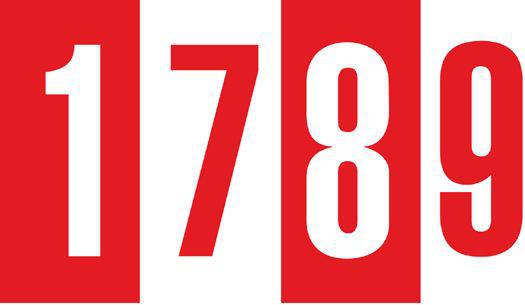
GEORGE WASHINGTON
VS.
HIMSELF
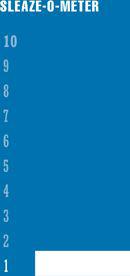
Welcome, mighty chief! Once more
Welcome to this mighty shore
Now no mercenary foe
Aims at thee the fatal blow!
Ode to George Washington performed by thirteen girls (one for each of the new states) as Washington journeyed to his first inauguration
I n the very beginningbefore primaries, spin control, PACs, sound bites, hanging chads, and talking headselecting a president was a clean, sober, and dignified business.
Before the first presidential election in 1789, Alexander Hamilton envisioned future candidates as men most likely to possess the information and discernment requisite to such complicated investigations. Those who chose such men would, by definition, be men of high seriousness and probity, the kind of men who might pick a pastor for a church or select the head of a new university.
And the first time, it worked out pretty much that way.
 THE CAMPAIGN (SUCH AS IT WAS)
THE CAMPAIGN (SUCH AS IT WAS) 
In 1789, America was like a newborn babe, and since the birth pains included a bloody and divisive war, a calming paternal figure was needed. The only one who really fit the bill was Commander-in-Chief George Washington, who was even then being called the father of his country.
Next page
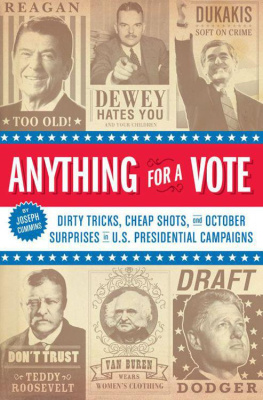
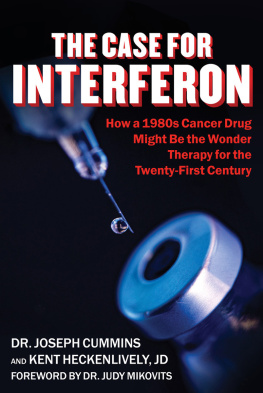

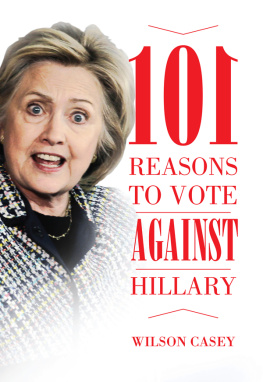
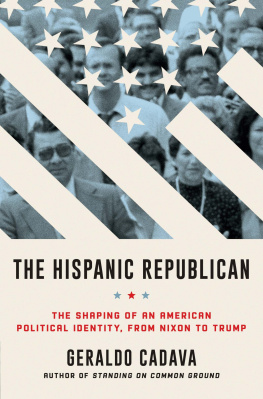
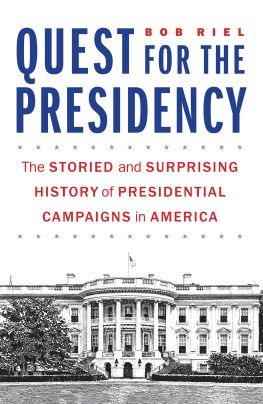
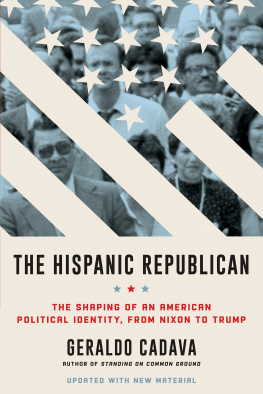

 F OR D EDE AND C ARSON ,
F OR D EDE AND C ARSON ,
 INTRODUCTION
INTRODUCTION 

